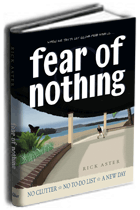If you want to be organized, you have to have a filing system.
It’s just a matter of numbers. Over the course of a decade, you might have 50 pieces of silverware, 100 pairs of socks . . . but 50,000 papers, cards, letters, receipts, coupons, and other documents. If you were to make a raw count of physically separate items, there is a good chance that more than half of the items you own are papers. It is only by keeping them under control that you avoid being swamped by paper.
But please, don’t simply organize all the papers you have. You can probably get rid of most of them. Many papers that come into your hands don’t need to be kept at all. The rest stay relevant for a limited period of time. The life span of a printed piece of paper may be defined by the expiration date of a coupon, the store return policy for a routine personal purchase, the life of a vehicle for which you are keeping maintenance records, or the recordkeeping requirements of a tax jurisdiction for business transactions. If a paper document is too old to matter, don’t worry about organizing it — just toss it.
Even the IRS, the largest tax authority in the United States, is now urging restraint in keeping records. Until a couple of years ago, the IRS was strict about the length of time that certain records must be kept. Now it is advising taxpayers to consider the inherent security risks of keeping documents when deciding how long to keep them.
As a second level of reducing the physical size of files, it may be easier to scan a document and keep the digital image than to keep the original paper. Assuming you have a computer and a scanner, this works for most documents. It is less work than keeping papers in a cabinet for years.
I know about all this because I have been through it. There was a time when I had a five-drawer file cabinet. It was too much — I reduced it to three drawers. I started scanning documents and reduced my files to two drawers, then one. Recently I have been using a six-inch file box.
In the end, though, I still have papers and cards that are important to have in physical form. These include identity documents, licenses, and diplomas. There are also receipts and papers that are too ephemeral to bother scanning. I’ll keep many receipts for a couple of weeks before throwing them away.
Since I live in the United States, the largest category of papers I need to keep are health care papers — hundreds of pages every year. They are too much work to scan. I hope I will have no use for them before they become obsolete at the end of the plan year, but I will need them in the event that I fall ill and go to the hospital. I’ll have to refer to them then to sort out the inevitable disputes that will follow. I have seen the piles of paper that belong to people who actually use medical care. Health care is surely the biggest category of essential papers for most Americans.
The basics of filing are well known: group things by purpose and by time period. If you keep papers related to repairs, for example, have a separate folder for each thing that is being repaired. Then, when you scrap the appliance or car or move out of the house, it is easy to discard the obsolete repair documents. Similarly, organize health insurance documents by plan year, and it makes it easier to discard the ones that are out of date.
Group things according to the way you use them, and not according to broad subject areas that might come to mind. A restaurant menu and a recipe might both refer to food, but you would never use the two together, so these categories would call for separate folders.
My current issue with files is that I should be keeping more things in the file box instead of out on the desk or on a shelf. There are enough of these things that I might go back to using a file drawer again. Things like checkbooks and store coupons serve you better if they are stored away in something like a file folder so that you know exactly where they are.
As I reorganize my files today, I am looking for a small box I can use to store my credit cards, shopper cards, and similar small items that I don’t use every day. These kinds of small things can get lost in a file folder or if you toss them in a drawer, but you also want them to be easily accessible.
Where should you keep your files? If you have decluttered your personal files, there should be so few of them that it probably makes the most sense to keep them all in once place. Maybe it is a file drawer. Keep the files you hope to never need at the back of the drawer, the ones you use almost every week at the front of the drawer. If the drawer is not large enough, perhaps some of the mandatory records that you don’t expect to ever need can go in a box in the attic. Make sure you know exactly where your most critical documents are. Maybe this include a passport, bank cards, licenses, certificates, and financial instruments. If they are all in a single folder, pouch, or box that you can grab on your way out during an emergency evacuation, it may save you a lot of trouble. Consider this scenario when you decide where you want to keep your files. They should be in a place that is easy enough for you to get to.
Files are easier to use when they are well organized, and the secret to a good filing system is decluttering. Throw away all the papers you really don’t have a reason to keep, and it is not so hard to organize everything that remains.



No comments:
Post a Comment